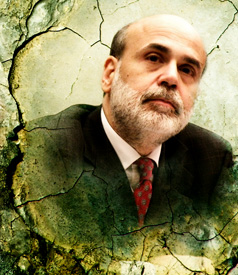The financial reform bills moving through Congress offer some hope for a more stable financial system. While there is still much up for grabs, it is likely that whatever gets through Congress will improve regulation of derivatives, increase regulators’ ability to restrict leverage and establish a consumer financial products protection agency. It could also lead to a separation of trading from commercial banking. This will decrease the risk of taxpayers subsidizing risky deals.
But there are good grounds for questioning whether the reform proposals will lead to fundamental changes in the financial system and prevent the recurrence of the sort of speculative bubble that wrecked the economy. With the exception of proposals coming out of the Senate Agriculture Committee, which would prohibit commercial banks from being involved in trading derivatives, there is little in the bills before Congress that would change the fundamental structure of the financial industry. The enormous consolidation that has taken place over the last two decades would be left in place with huge “too big to fail” (TBTF) banks still dominating the sector.
This is important for two reasons. First, a TBTF bank enjoys an inherent advantage over its competitors because of its implicit guarantee from the government. If investors believe that the government will ultimately step in and bail out investors because the economic consequences of letting them take a big hit is too great, they will be willing to lend money at a lower cost to TBTF banks than their competitors. I calculated that the size of this implicit government subsidy to TBTF banks could be as much as $34 billion a year.
The bills before Congress include provisions that are supposed to convince investors that the government will not stand behind TBTF banks. The deal is that the government will stand behind insured deposits, but, after that, investors will be on their own. That’s a great principle, but will investors believe that the government will let the collapse of a TBTF bank wipe out hundreds of billions of dollars of unsecured debt? If not, then the TBTF subsidy will persist, even with all the politicians’ protestations about no more bailouts.
However, the bigger problem with TBTF banks is their political power. The TBTF banks have pushed their tentacles deep within the regulatory structure. They have important contacts at the Fed, the Treasury, the FDIC, and other regulatory agencies. In fact, many of the top officials at these agencies were formerly high-level executives at the TBTF banks. This means that, at the very least, the big banks can count on a full hearing of their position when any issue comes up with the regulators. Of course, in the less generous view, we can expect the regulators to bend the law to help their friends.
This brings up a basic point that cannot possibly be repeated enough. Any regulation is only as good as its enforcement. It will never be easy for regulators to enforce rules against large banks. By definition, regulation means preventing banks from earning higher profits. Banks will, therefore, use whatever political power they have to prevent the enforcement of a rule they view as costly. They will use all their contacts in the regulatory agencies, the White House and Congress to stop a regulator whom they view as an enemy.
Regulators are not generally selected for their courage. This means that it will usually be easiest for them to ignore abuses in the major banks, even if they perceive them as dangerous. Remember, the banks will always have a story as to why their actions are perfectly safe and within the law. The banks pay very smart people lots of money to develop these stories.
For this reason, Ben Bernanke’s reappointment as Fed chair was a huge setback for the cause of regulatory reform. Bernanke, in his role as Fed chair and a Fed governor since 2002, was as guilty as anyone could possibly be of ignoring financial abuses. The Fed had all the power necessary to prevent the buildup of a dangerous housing bubble. It looked the other way with disastrous consequences. The Obama administration and Congress then patted Bernanke on the back, said “heckuva of a job, Ben,” and gave Bernanke a second term. This move certainly does not give regulators a lot of incentive to incur the wrath of the big banks by clamping down on risky dealings.
There is still hope that the financial industry can be fixed. An amendment put forward by Ohio Sen. Sherrod Brown will cut the biggest banks down to size, although they will still be TBTF by any reasonable measure.
The better route involves a downsizing of the industry as a whole. This can best be accomplished through a modest financial speculation tax (FST) like the 0.5 percent tax on stock trades that the United Kingdom has imposed for decades. Such a tax would quickly eliminate many risky deals by making them unprofitable. It would also reduce the size of the industry, making it less politically powerful. And a FST could easily raise more than $100 billion a year.
Congress is not going to include an FST in this round of reform, but bills for such a tax have been introduced by Peter Defazio in the House and Tom Harkin in the Senate. With Congress becoming obsessed with deficit reduction, the public should insist that an FST be at the center of the agenda.
Join us in defending the truth before it’s too late
The future of independent journalism is uncertain, and the consequences of losing it are too grave to ignore. To ensure Truthout remains safe, strong, and free, we need to raise $24,000 by the end of today. Every dollar raised goes directly toward the costs of producing news you can trust.
Please give what you can — because by supporting us with a tax-deductible donation, you’re not just preserving a source of news, you’re helping to safeguard what’s left of our democracy.
